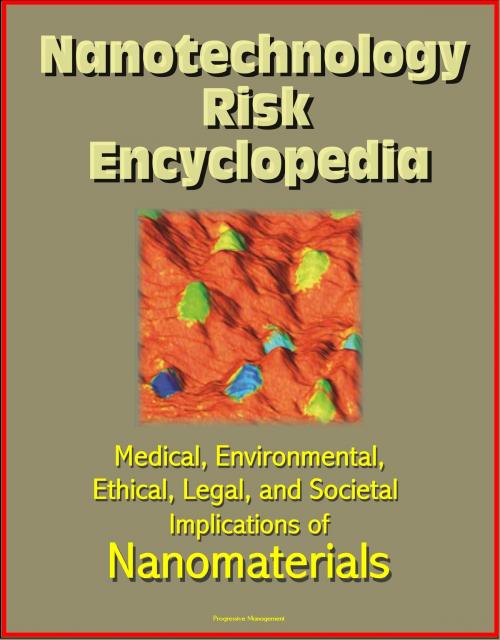Nanotechnology Risk Encyclopedia: Medical, Environmental, Ethical, Legal, and Societal Implications of Nanomaterials
Nonfiction, Science & Nature, Technology, Nanotechnology| Author: | Progressive Management | ISBN: | 9781301927395 |
| Publisher: | Progressive Management | Publication: | May 30, 2013 |
| Imprint: | Smashwords Edition | Language: | English |
| Author: | Progressive Management |
| ISBN: | 9781301927395 |
| Publisher: | Progressive Management |
| Publication: | May 30, 2013 |
| Imprint: | Smashwords Edition |
| Language: | English |
Eight Federal reports provide a complete overview of the safety, health and environmental issues involved with nanotechnology and nanomaterials. There is information from the Environmental Protection Agency (EPA), National Institutes of Health (NIH), and Food and Drug Administration (FDA). The reports include:
Risk Management Methods, & Ethical, Legal, and Societal Implications of Nanotechnology * Responsible development of nanotechnology depends upon managing the potential risks posed by this technology. One of the purposes of the Capstone Workshop on Risk Management Methods & Ethical, Legal, and Societal Implications of Nanotechnology was to discuss the information available and the research needed on risk management methods to inform decisions about the environmental, health, and safety (EHS) implications of nanomaterials. The other purpose was to explore the important role played by ethical, legal, and societal implications (ELSI) of nanotechnology.
EPA Nanotechnology White Paper * This document describes the issues that EPA should consider to ensure that society benefits from advances in environmental protection that nanotechnology may offer, and to understand and address any potential risks from environmental exposure to nanomaterials. Nanotechnology will have an impact across EPA.
Nanomaterial Research Strategy * With the use of nanotechnology in the consumer and industrial sectors expected to increase significantly in the future, nanotechnology offers society the promise of major benefits. The challenge for environmental protection is to ensure that, as nanomaterials are developed and used, unintended consequences of exposures to humans and ecosystems are prevented or minimized. In addition, knowledge concerning how to sustainably apply nanotechnology to detect, monitor, prevent, control, and clean up pollution is needed.
EPA Building a Scientific Foundation for Sound Environmental Decisions - Science in Action * Research is needed to develop pollution control technologies and determine the application of nanotechnology to reduce waste during manufacturing processes or to enhance manufacturing efficiencies so that pollution is prevented. For example, nanomaterials from natural bio-products (such as plant extracts) may replace some petroleum-based materials, thus reducing the pollution that occurs in the production and disposal of these products.
Nanoscale Materials Stewardship Program * Nanotechnology at the National Institutes of Health * There are unanswered questions about the potential risks of nanoscale materials to human health and the environment. Under the Toxic Substances Control Act (TSCA), EPA has the obligation to ensure that potential risks are adequately understood and controlled to protect human health and the environment.
Nanotechnology Programs Progress Review - National Institutes of Health * Three main areas describe the NIH investment in nanotechnology: (1) areas of funding, (2) major initiatives at NIH, and (3) an overview of NIBIB program areas and investments.
Nanotechnology - A Report of the U.S. Food and Drug Administration Nanotechnology Task Force - The report addresses scientific issues as distinct from regulatory policy issues in recognition of the important role of the science in developing regulatory policies in this area.
Eight Federal reports provide a complete overview of the safety, health and environmental issues involved with nanotechnology and nanomaterials. There is information from the Environmental Protection Agency (EPA), National Institutes of Health (NIH), and Food and Drug Administration (FDA). The reports include:
Risk Management Methods, & Ethical, Legal, and Societal Implications of Nanotechnology * Responsible development of nanotechnology depends upon managing the potential risks posed by this technology. One of the purposes of the Capstone Workshop on Risk Management Methods & Ethical, Legal, and Societal Implications of Nanotechnology was to discuss the information available and the research needed on risk management methods to inform decisions about the environmental, health, and safety (EHS) implications of nanomaterials. The other purpose was to explore the important role played by ethical, legal, and societal implications (ELSI) of nanotechnology.
EPA Nanotechnology White Paper * This document describes the issues that EPA should consider to ensure that society benefits from advances in environmental protection that nanotechnology may offer, and to understand and address any potential risks from environmental exposure to nanomaterials. Nanotechnology will have an impact across EPA.
Nanomaterial Research Strategy * With the use of nanotechnology in the consumer and industrial sectors expected to increase significantly in the future, nanotechnology offers society the promise of major benefits. The challenge for environmental protection is to ensure that, as nanomaterials are developed and used, unintended consequences of exposures to humans and ecosystems are prevented or minimized. In addition, knowledge concerning how to sustainably apply nanotechnology to detect, monitor, prevent, control, and clean up pollution is needed.
EPA Building a Scientific Foundation for Sound Environmental Decisions - Science in Action * Research is needed to develop pollution control technologies and determine the application of nanotechnology to reduce waste during manufacturing processes or to enhance manufacturing efficiencies so that pollution is prevented. For example, nanomaterials from natural bio-products (such as plant extracts) may replace some petroleum-based materials, thus reducing the pollution that occurs in the production and disposal of these products.
Nanoscale Materials Stewardship Program * Nanotechnology at the National Institutes of Health * There are unanswered questions about the potential risks of nanoscale materials to human health and the environment. Under the Toxic Substances Control Act (TSCA), EPA has the obligation to ensure that potential risks are adequately understood and controlled to protect human health and the environment.
Nanotechnology Programs Progress Review - National Institutes of Health * Three main areas describe the NIH investment in nanotechnology: (1) areas of funding, (2) major initiatives at NIH, and (3) an overview of NIBIB program areas and investments.
Nanotechnology - A Report of the U.S. Food and Drug Administration Nanotechnology Task Force - The report addresses scientific issues as distinct from regulatory policy issues in recognition of the important role of the science in developing regulatory policies in this area.















